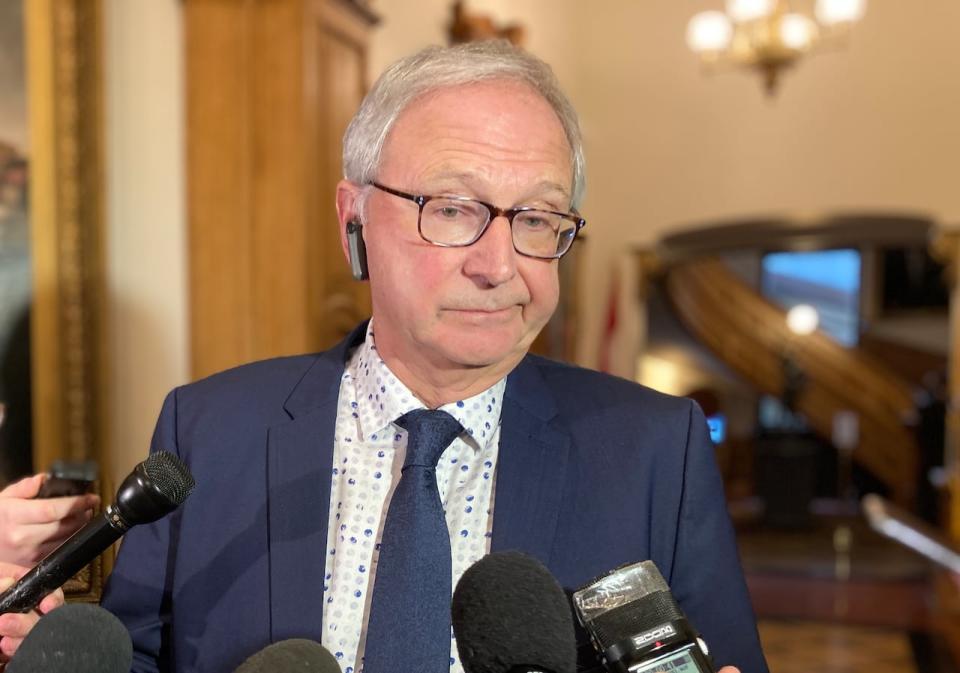Pension bill targeting school board, nursing home workers grants a pass to judges

A decision by the New Brunswick government to exclude a financially troubled pension plan for provincial court judges from changes being forced on five other government pension plans is testing arguments that fiscal responsibility and fairness are soley behind the controversial initiative.
Last week, Finance Minister Ernie Steeves introduced the Pension Plan Sustainability and Transfer Act to force five government "defined-benefit" pension plans serving school board and nursing home employees to switch to a "shared-risk" model.
The existing defined-benefit plans offer pensioners guaranteed retirement amounts that the province has to pay for if pension funds are not sufficient to meet the obligations.
Shared-risk plans limit the amount government is responsible for when full retirement benefits and inflation protection of those benefits exceed a pension fund's ability to fully pay for them.
Premier Blaine Higgs told MLAs the forced changes were necessary to fix funding problems with the "five unsustainable pension plans" and to promote equity with other provincial government plans serving teachers, civil servants and others that switched to the shared-risk model years ago.
"The current pension plans are unsustainable and our government has a responsibility to ensure all pension plan participants have a plan comparable to other government employees," Higgs said before the pension bill was introduced.

CUPE president Stephen Drost says members in unions having their pensions changed unilaterally by the New Brunswick government are preparing to respond 'We certainly are looking at every action, and this is not just going to be symbolic." (Jacques Poitras/CBC)
However, contrary to what the premier suggested, not all of the five plans targeted by the legislation are in financial difficulty.
According to the government's own briefing materials, two of the five pension funds, including one that serves 500 current and retired nursing home managers and one that serves more than 1,000 nurses and paramedical employees working in nursing homes, are both fully funded with surpluses.
The three remaining pension plans targeted by the legislation do have deficits, but all three serve members of the Canadian Union of Public Employees, and union official Mark Janson said those deficits were primarily caused by the province in the first place.
He points to an independent labour arbitration review in 2021 that found one of the school board pension funds was wrongly starved for money by the province over several years by withholding millions of dollars in required payments.
He also points to a second report issued earlier this year by Angela Mazerolle, New Brunswick superintendent of pensions, who found a series of finance ministers beginning with Higgs in 2014 failed to properly supervise the funding of the financially troubled pension plan for nursing home workers.
"I think there was a political decision at some point by the New Brunswick government to just not fund these plans as part of a political effort to move them into the shared-risk model," Janson said.

Premier Blaine Higgs said he was compelled to take action against 'five unsustainable pension plans,' although two are running a surplus and the other three are in better financial shape than a pension plan for judges that is not changing. (Jacques Poitras/CBC)
Another oddity in the legislation is that the five pension funds being forced to change for being "unsustainable" are all in better financial shape than a pension plan that serves provincial court judges, which is nevertheless excluded from the legislation.
Judges have a defined-benefit pension plan like the five targeted plans but with more expensive provisions.
Judicial retirement benefits accumulate at three per cent of a judge's salary per year, a rate up to double those in the other five plans.
Judges earn $300,000 a year. That salary, combined with the rate at which retirement benefits accumulate, can qualify a provincial court judge for a $90,000 annual lifetime and indexed pension after just 10 years on the bench.
Maximum pensions of up to $195,000 at current pay scales can be earned after 22 years of service.
The financing of benefits that generous has saddled the judge's pension fund with a significant deficit that in the past the province has said needs to be fixed.
According to New Brunswick's latest public accounts, the plan's "net benefit liability," or the amount that pension obligations exceed pension assets, was $46.3 million in March.
With only 65 current and retired judges and surviving spouses in the plan, it is a funding shortfall of $712,300 per plan member.

Nursing home workers walk along Mountain Road in Moncton's north end this summer. Earlier this year New Brunswick's supervisor of pensions found that as finance minister in 2014 Blaine Higgs failed to have the adequacy of their pension plan funding reviewed. (Shane Magee/CBC)
By contrast the shortfall in the three pension plans with deficits the provincial government is forcing to change is just over $22,000 per current and retired employee.
In the legislature last Friday, Higgs said any government-sponsored pension plan that requires the province to fund a pension plan at levels "three to one, four to one" of what members of the plan themselves contribute is wrong.
"It's not fair," Higgs said. "It's not fair, so you'd have to say this needs to be fixed."
The judge's plan requires the province to pay nearly six to one what judges pay to support the plan, a level none of the other plans approach.
Last year, lawyers for the provincial government told New Brunswick's Judicial Remuneration Commission there was no reason for judges to have a pension plan as expensive as this one.
It asked the commission to approve a switch of the judges pension plan to a shared-risk model with benefits similar to other government plans.
"As was expected, the Provincial Court Judges Association vigorously opposed these changes," the three-person commission said in its account of the province's pension proposals.
The commission eventually sided with judges and recommended against the pension changes but noted in its final report that the government was free to reject its advice on this or any issue related to judicial pay, if it had a reason significant enough.
"The government can reject or vary the commission's recommendations provided that legitimate reasons are given," it said, quoting a Supreme Court decision outlining how that procedure works.
Instead, the province accepted the commission's recommendation to keep the judges' pension plan unchanged and then excluded it from the forced changes the five other plans now face.
Questions posed to the Finance Department by CBC News last week about why an initiative to forcibly fix "unsustainable" pension plans includes two plans not in financial difficulty and excludes one with the largest funding deficit of any government plan were acknowledged, but have not been answered.


